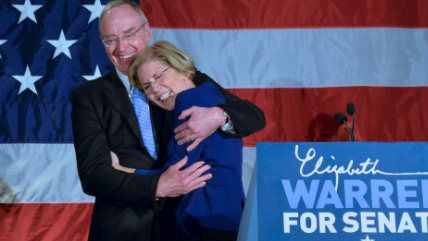Elizabeth Warren's Dynamic Appeal
Warren's positions far more closely reflect the sensibilities of the modern-day Democratic Party than Hillary Clinton's.

When Sen. Elizabeth Warren rallied beleaguered House liberals to push back against a bank-coddling omnibus bill and the spineless White House that enabled it, she showed us some of her dynamic appeal. Passing trillion-dollar pieces of legislation should never be easy, and disrupting the current cozy, bipartisan environment surely can't be a bad thing.
As Warren was disrupting D.C., it's not difficult to imagine Hillary Clinton ensconced in her penthouse suite in whatever city she's about to give a six-figure lecture in, contemplating every conceivable political angle of this debate, tabulating every potential big-money donor's interests, and asking obsequious staffers how polling looks before composing her own opinion on the matter. That's because Hillary is the Democrats' Mitt Romney. And Democrats would be engaging in a historic act of negligence if they allowed her to run unopposed for president.
The most obvious reason bolstering my concern trolling is that Warren's positions far more closely reflect the sensibilities of constituents in the modern-day Democratic Party, not only in substance but in tone.
Her hard-left economics—what the press quixotically refers to as "economic populism"—propel today's liberal argument. It's the default position of nearly every grass-roots constituency on the left, the center of the Democrats' agenda. This is not just reflected in the embrace of class struggle ("inequality") but a slow warming to socialist ideas (and I'm not throwing the word in as invective; I mean it in the most literal sense). Right now, few, if any, politicians are better than Warren at stoking the anxiety that makes that work.
Moreover, Warren, hopelessly wrong as she is, is liable to offer the country a better class of political debate than the one we've lived through for the past eight years. There's no doubt that hackneyed wars on women, minorities, and common sense will remain. But it's fair to say that Warren's histrionics are often built atop genuine policy beefs rather than straw men. They often reflect legitimate questions about cronyism. Not only would Warren compel Hillary to avoid any premature triangulation but also her presence in the race might impel Republican candidates to engage in a worthwhile conversation about corporatism and free markets.
On a practical level, Warren has simply one thing to think about: Hillary is beatable—very beatable.
It would be one thing if the establishment candidate had proved her worth as a scary political entity. There is no Rick Lazio on her horizon. And there is not a single shred of evidence that demonstrates Hillary is a talented or charismatic candidate or leader.
Much like Romney, who struggled to offer a credible argument against Obamacare because of his own history, Clinton will be constrained to make the Democrats' most powerful cases against big business, big banks, or big anything. The most persuasive reasons Hillary has are her inevitability (again) and name recognition. One of those is ephemeral. The other can work both ways.
Last week, a number of pro-Hillary pundits pointed to a new Bloomberg poll that found that more than half of Americans hold favorable views of Clinton. What they talked about less, though, was that her favorability has significantly dropped from a 70 percent rating at the end of 2012. History tells us that Clinton is most liked when she's least seen. It is clear that most of her popularity is derived from name ID, because another noteworthy aspect from the Bloomberg poll is that her most obvious advantages could easily be turned against her.
Here, for example, are the top areas those polled gave as advantages for her candidacy:
1) She has served as secretary of state for four years; 77 percent believe this is an advantage.
2) She is married to former President Bill Clinton (67 percent).
3) She has run for president before (60 percent).
4) She served for four years in the Obama administration (59 percent).
5) She has close ties to Wall Street (52 percent).
6) She has lived in Washington and worked in the federal government (78 percent).
When was the last time you heard a political ad boasting about a candidate's close ties to Wall Street? Is that really going to be helpful? When was the last time you heard an ad argue that the right choice was someone who had spent most of his or her life working for the federal government and living in Washington? When was the last time anyone was bragging about his or her association with the Obama administration? Does anyone really believe that the person who was principally concerned with the foreign affairs of the United States for four years left us in a better position?
You may remember that in 2008, we heard a lot about Hillary's appeal to white working-class Democrats. You couldn't win without them. In 2008, much of the establishment lined up behind her inevitability and ability to raise money. Barack Obama spent more than any candidate in both his races. Hillary was beatable then, and she is beatable now. Her complete lack of authenticity remains. The history that made her unappealing to so many in 2008 remains. She is impure. Like all those who put their faith in politics, the flock will, in the end, be disenchanted with Warren. But messianic figures win elections. And right now, Democrats need a new one.
Do it for America, Liz.

Show Comments (128)